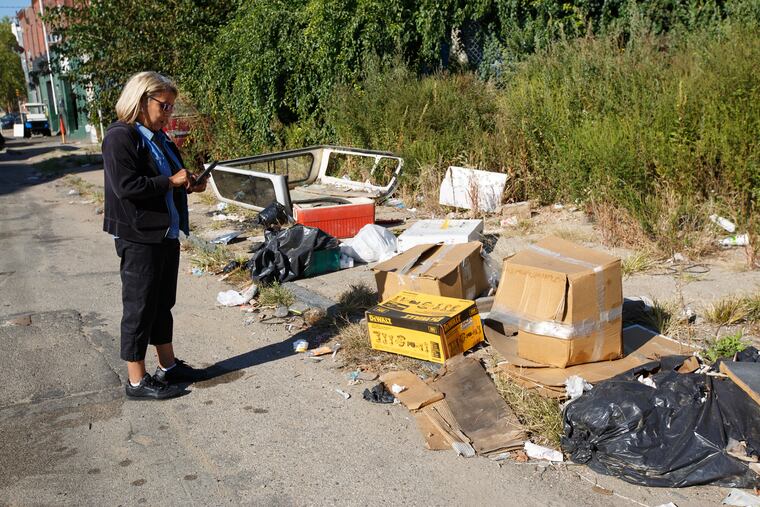Cities across the country pay the homeless to pick up litter. Philadelphia may follow suit.
Albuquerque, N.M.; Chicago; Denver; Seattle; and San Diego are a few of the cities that have similar programs for homeless residents.

 San Jose, Calif., will pay $15 per hour to people who are homeless to pick up litter starting this month, joining more than a dozen other cities that offer similar programs. And Philadelphia is considering following its lead.
San Jose, Calif., will pay $15 per hour to people who are homeless to pick up litter starting this month, joining more than a dozen other cities that offer similar programs. And Philadelphia is considering following its lead.
Twenty-five people will be part of San Jose's pilot program and will work four to five hours per day every week or two. They will focus on roughly 40 litter hot spots the city has identified along major roadways. The city will pay for the program with $200,000 from its general fund. Mayor Sam Liccardo said he hopes to expand the initiative after the pilot ends in June.
"We want to see every one of these individuals housed and moving on to steady employment," while also helping to reduce litter and blight, Liccardo said. Workers also will receive support services.
The city of roughly 1 million located about an hour south of San Francisco has a homeless population of more than 4,300 people.
Albuquerque, N.M.; Chicago, Denver, Seattle, and San Diego are a few of the cities nationwide that have similar programs for homeless residents.
Since Philadelphia has both a litter problem and a housing problem, the city has considered doing the same. City officials have been looking into Albuquerque's "There's a Better Way" initiative as a model. The New Mexico city's Solid Waste Department picks up people who are homeless and offers them day labor, such as garbage removal and landscaping, and connects them with social services.
"We would love to do it," said Liz Hersh, director of Philadelphia's Office of Homeless Services. "We're not there yet."
Philadelphia's homeless population is roughly 5,800 people, more than 900 of whom live outdoors. Hersh said other projects have taken precedence.
"As we were looking at the panhandling problem, we got slammed with the opioid epidemic," she said.
But she pointed to an upcoming pilot program that will employ the homeless, and an employment program that a nonprofit started this year.
Mural Arts Philadelphia is partnering with the nonprofit Mental Health Partnerships to hire people to help paint murals in SEPTA's Center City concourses with funding from the Barra Foundation, based in Delaware County, and the Sheller Family Foundation, based in Philadelphia.
"It's sort of a dream come true for us," said Jane Golden, founder and executive director of Mural Arts Philadelphia. "It's providing people with opportunities to see gifts and talents and opportunities to do work that is really important work, because it's about beautifying the built environment in our community."
Mural Arts plans to start the two-year pilot program on April 1 with up to 10 people per day four days a week. The program will recruit people from the Center City area and pay a wage that is competitive with what they would collect while panhandling — $20 a day on average, according to a city survey. The "preemployment" program will include support services.
Earlier this year, First Step Staffing, a nonprofit staffing company based in Atlanta, came to Philadelphia to hire people who were homeless or formerly incarcerated for light-industrial jobs. Of the 650 people now employed through the nonprofit, about 400 were homeless when they started, said Dave Shaffer, chief executive officer. Of the total, about 25 percent have moved on to full-time positions.
The first workers in San Jose's program will start the week of Nov. 12. The mayor said private sector employers have offered to help expand the program, which formed from a partnership between the city, the nonprofit Downtown Streets Team, and Goodwill. The nonprofits will screen, hire, and supervise workers.
"We have a crisis of homelessness like every major city on the West Coast right now, but increasingly the palpable signs of that homelessness are encampments and trash and disorder in those neighborhoods where encampments are popping up," the mayor said. "It's caused some residents to point the finger at the homeless as the problem. It's important to demonstrate through this program that homeless individuals want to be part of the solution."
Philadelphia Media Network is one of 21 news organizations producing Broke in Philly, a collaborative reporting project on solutions to poverty and the city's push towards economic justice. See all of our reporting at https://brokeinphilly.org.